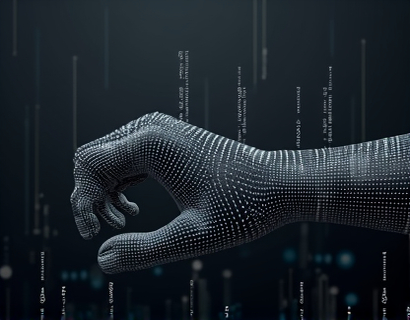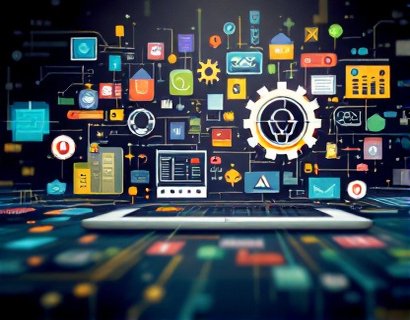Transforming Digital Experiences: The Synergy of Crypto and AI
The intersection of cryptocurrency and artificial intelligence (AI) is giving rise to a new era of digital transformation, one that promises to redefine how we interact with online platforms and services. For tech innovators and early adopters, this convergence offers unprecedented opportunities to enhance their digital presence and experience. This article delves into the cutting-edge tools and services that harness the power of both technologies, providing a comprehensive look at the future of digital innovation.
The integration of AI with blockchain technology is not just a novel concept but a practical approach to creating more efficient, secure, and user-friendly digital solutions. AI's ability to process vast amounts of data and learn from patterns makes it an ideal companion for the decentralized and transparent nature of cryptocurrencies. Together, they are paving the way for next-gen applications that offer seamless and advanced digital experiences.
Enhanced Security Through AI and Crypto
One of the most significant benefits of combining AI with cryptocurrency is the enhancement of security measures. Traditional online systems often struggle with vulnerabilities and breaches, but the fusion of AI and blockchain technology can significantly mitigate these risks. AI algorithms can monitor network activity in real-time, detecting and responding to anomalies with unprecedented speed and accuracy. This proactive approach to security ensures that transactions and data remain protected against cyber threats.
For instance, AI-driven security protocols can identify suspicious patterns that may indicate a potential attack, allowing for immediate action to be taken. Smart contracts, which are self-executing contracts with the terms directly written into code, can also benefit from AI. These contracts can automatically enforce and verify conditions, reducing the need for intermediaries and minimizing the risk of fraud.
Personalized User Experiences
AI's strength lies in its ability to personalize experiences based on user behavior and preferences. When applied to cryptocurrency and blockchain-based services, this capability can lead to highly tailored interactions. Users can enjoy customized recommendations, streamlined interfaces, and optimized functionalities that cater to their specific needs. This level of personalization not only enhances user satisfaction but also increases engagement and loyalty.
For example, a decentralized finance (DeFi) platform can use AI to analyze a user's transaction history and investment preferences to suggest optimal trading strategies or investment opportunities. This personalized approach can help users make more informed decisions and maximize their returns, all while enjoying a more intuitive and user-friendly experience.
Streamlined Transactions and Interoperability
The complexity of managing multiple cryptocurrencies and blockchain networks can be daunting for users. AI can simplify this process by automating transactions and ensuring seamless interoperability between different platforms. AI-powered wallets and exchanges can intelligently handle cross-chain transactions, converting currencies and executing smart contracts without manual intervention. This not only saves time but also reduces the potential for human error.
Moreover, AI can optimize transaction fees and processing times by analyzing network conditions and selecting the most efficient routes. This level of optimization is particularly valuable in the DeFi space, where even minor delays or high fees can significantly impact the effectiveness of financial operations.
Innovative Financial Instruments
The combination of AI and cryptocurrency is also giving birth to new financial instruments that offer enhanced functionality and flexibility. AI-driven predictive analytics can provide insights into market trends and asset performance, enabling users to make more informed investment decisions. These insights can be integrated into various financial products, such as AI-powered trading bots and automated investment portfolios.
Additionally, AI can facilitate the creation of more sophisticated tokens and security tokens, which can represent a wide range of assets and rights. These tokens can be designed to adapt to changing market conditions, offering dynamic value propositions to investors. The use of AI in token design and management ensures that these financial instruments are not only innovative but also robust and reliable.
Enhancing Decentralized Applications (DApps)
Decentralized applications (DApps) are at the forefront of the blockchain revolution, and AI is playing a crucial role in their development and functionality. AI can enhance the capabilities of DApps by providing intelligent features such as natural language processing, image recognition, and predictive analytics. These features can transform DApps into powerful tools that offer advanced functionalities beyond traditional web applications.
For instance, a decentralized social media platform can use AI to moderate content, detect and remove harmful posts, and personalize user feeds based on engagement and preferences. This not only improves the user experience but also aligns with the decentralized ethos of community-driven moderation and content curation.
Data Privacy and User Control
Data privacy has become a paramount concern in the digital age, and the combination of AI and cryptocurrency offers solutions that empower users to control their personal data. Blockchain's inherent transparency and immutability, when paired with AI's data processing capabilities, can create systems where users have full control over their data. AI can help manage consent, anonymize data, and ensure compliance with privacy regulations.
Users can grant or revoke access to their data with precision, and AI can monitor and enforce these permissions in real-time. This level of control not only enhances privacy but also builds trust between users and the platforms they interact with. The result is a more secure and user-centric digital environment.
Challenges and Considerations
While the potential of AI and cryptocurrency is vast, there are challenges that need to be addressed. One of the primary concerns is the regulatory landscape, which is still evolving and often fragmented across different regions. Navigating these regulations requires a deep understanding of both technologies and their implications. Additionally, the technical complexity of integrating AI with blockchain systems can be a barrier for some developers and organizations.
Another consideration is the energy consumption associated with blockchain mining and AI computations. As the demand for these technologies grows, so does the environmental impact. Innovations in sustainable blockchain solutions and energy-efficient AI algorithms are essential to address these concerns and ensure the long-term viability of these technologies.
Future Prospects
The future of digital experiences is bright, with AI and cryptocurrency set to continue their transformative journey. As these technologies mature, we can expect even more innovative applications and services that push the boundaries of what is possible. The convergence of AI and blockchain will likely lead to the development of new paradigms in areas such as virtual reality, Internet of Things (IoT), and smart cities.
For tech innovators and early adopters, embracing this synergy offers a competitive edge and the opportunity to shape the future of digital interactions. By staying at the forefront of these advancements, they can leverage the full potential of AI and cryptocurrency to create groundbreaking solutions that enhance their digital presence and drive forward-thinking transformation.
In conclusion, the integration of AI and cryptocurrency is not just a technological trend but a fundamental shift in how we approach digital experiences. By harnessing the strengths of both technologies, we can create a more secure, personalized, and efficient digital world. For those who are ready to embrace this change, the possibilities are endless.











































